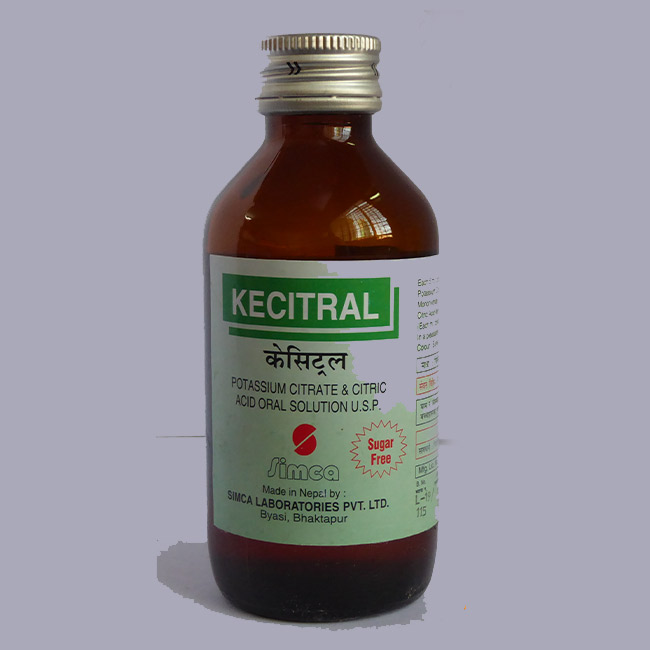Kecitral
KECITRAL
Generic composition: Potassium citrate 1100mg and citric acid 334mg/5ml
General Introduction
Potassium citrate/citric acid solution is a urinary alkalinizing agent. It neutralizes acidic nature of urine and also reduces the formation of crystals that could become kidney stones or aggravate gout.
Therapeutic category
- Urinary Alkalizer
Dosage forms available
- KECITRAL 100/170ml bottle
Mechanism of action
Potassium citrate induces changes in the urine which renders urine less susceptible to the formation of crystals and stones from salts e.g. calcium oxalate, calcium phosphate and uric acid. Citric acid is used as an acidulant to control pH and acts as an anticoagulant by chelating calcium in blood.
Pharmacokinetics
Potassium citrate is absorbed and metabolized to potassium bicarbonate, thus acting as a systemic alkalizer. The effects are essentially those of chlorides before absorption and those of bicarbonates subsequently. Oxidation is virtually complete so that less than 5% of the potassium citrate is excreted in the urine unchanged.
Uses
- Maintenance of alkaline urine like uric acid, urinary tract calculi, urinary tract infection
- Burning micturation
- Replacement of potassium due to thiazide medication
- Reduction of crystaluria during sullphonamide therapy
Dosage
- 2-3 teaspoonful of solution mixed with water or juice, four times a day after meal.
Side effects
Abdominal pain, cramping, black stool, vomiting, heartbeat, muscle weakness, tingling in hands, feet or mouth.
Contraindications
Severe renal impairment with oliguria or azotemia, untreated Addison’s disease, adynamia episodica hereditaria, acute dehydration, heat cramps, anuria, severe myocardial damage, and hyperkalemia from any cause, allergic to the medication.
Precautions
- Large doses may cause hyperkalemia and alkalosis, especially in the presence of renal disease.
- Concurrent administration of potassium-containing medication, potassium-sparing diuretics, angiotensin-converting enzyme (ACE) inhibitors, or cardiac glycosides may lead to toxicity.
- Do not exceed recommended dosage. Discontinue use if adverse reactions occur.
- Should be used with caution by patients with low urinary output.
Drug Interactions
- antacids that contain aluminum, aspirin and other salicylates
- ACE inhibitors such as lisinopril,
- angiotensin blockers such as losartan)
- potassium-sparing diuretics such as amiloride, spironolactone, triamterene


